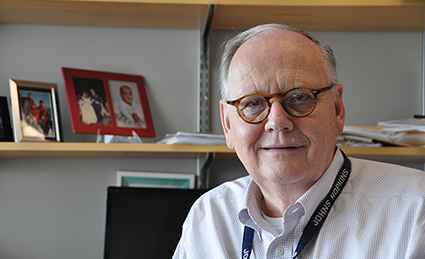
United Methodist doctor cited for pioneering health efforts
By Melissa Lauber
UMConnection Staff

Dr. Henry Perry has a small office with a large view. Located in the John’s Hopkins medical complex, the office of this world leader in community-based, impact-oriented health care has just enough room for a desk and a window with an expansive view of the city.
But Perry sees more than just Baltimore. He sees lives changed forever around the world.
The small office suits Perry, a member of Grace UMC in Baltimore, who for more than three decades has focused on vision and new ways of seeing medical care as he seeks to deliver “hope through health.”
The founder of Curamericas Global, Perry was honored Nov. 9 by Ronald McDonald Charities with their 2013 Medical Award of Excellence. At the $1,000 a plate award dinner in Chicago, he was presented with an award of $100,000, which he donated to Curamericas Global.
At the banquet, Dr. David Herman, a member of the Ronald McDonald House Global Board of Trustees, hailed Perry as a “physician, surgeon, researcher, writer, educator, innovator and thought leader,” whose life’s work “has been that all people, everywhere, deserve access to primary health care.”
Accepting the award, Perry’s thoughts turned to the almost 7 million children around the world who die each year of mostly preventable and treatable conditions; 99 percent of them in poor countries.
“I love these children,” he said. “Their suffering has kept me going – and so has their determination, grace and dignity. We need to hear their voices and understand their plight.”
Now 66, Perry has been listening to these children since he first met them in 1969, when he and other students from Duke University spent the summer in a rural village in Bolivia. The group vaccinated 10,000 Aymara Native-American children against measles that summer.
“It was a life-changing experience for me,” he said.
The village where they worked had no schools or health care facilities. “The Methodist Church was the only organization out there serving these people. It was inspiring to see,” he said.
Perry had given some serious thought to spending his life as a Methodist medical missionary.
“I grew up in a Methodist church in Greensboro, N.C. I had a strong faith orientation, a heart for service and a sense of compassion for people who didn’t have medical care. I thought if I could make some sacrifice, some impact, that would be a life well spent.”
Returning home, his life took a different course as he trained in general surgery and received a PhD in sociology and anthropology. The threads of practicing medicine and serving the poor continued to be intertwined in his life.
Thirty-five years ago, in Bolivia, he founded the NGO, Curamericas Global, with the mission to partner with underserved communities to make measurable and sustainable improvements in people’s health and well-being.
Curamericas Global is now active in Bolivia, Guatemala, Haiti and Liberia. Perry’s career has taken him to Bangladesh and Haiti to live and he has provided on-the-ground assistance to programs in 15 countries around the world. During this time, he also authored or co-authored more than 100 publications about primary health care and community-based approaches to health improvement.
The transition from surgeon to consultant and administrator was not without its challenges. “There’s a difference between knowing what your hands did for someone who needed surgery and believing that your efforts in public health, program leadership and teaching will reach more than you could ever imagine as a surgeon,” he said.
However, concerns like those faded when he and his team demonstrated that Curamericas’ program in Bolivia reduced the mortality rates of children younger than 5 years old by half.
The work in community health that Perry and others pioneered is becoming much more main stream as people around the world realize the importance of household visitation and making people active participants in their own well being.
In receiving the award and in his work teaching and mentoring young health professionals, Perry issued a challenge for all people, even churches, “to become fully engaged in the emerging global movement to end preventable maternal and child death in only two decades, – by the year 2035.”
This campaign, spearheaded by UNICEF and the World Health Organization, if it is successful, “will be one of the greatest achievements in history,” Perry said.
He hopes that United Methodists will not hesitate, or wait for an invitation, to act and make a difference in the health of children in their communities and around the world.
For those who want to be involved in health ministries, he advises: “Keep struggling with the issues. If it’s pulling at your heart, listen to it. It takes time to work things out. Be persistent. Don’t be afraid to grasp at an opportunity if it comes along. There is always risk. In this kind of work there are all kinds of complications. There is a cost to doing this kind of stuff. But saving the lives of people is a great way of serving and following in Christian discipleship.”
Looking out his window in Baltimore, Perry looks forward to the opportunities for expanding and strengthening programs that will save the lives of mothers and children. He is now engaged with the United Methodist Committee on Relief, which is collaborating with Curamericas Global to advance this model of health care in Liberia and (in the near future) in Sierra Leone.
Perry will be continuing this work to which he feels called because, like Woodrow Wilson, he believes that “there is no higher religion than human service.” His heart still resonates with the sentiments of Dr. Albert Schweitzer, who said, “the only ones among you who will be really happy are those who have sought and found how to serve.”
“I still feel like I’m doing the Lord’s work,” said Perry. “I still feel like a medical missionary at heart.”

Login/Register to leave comment